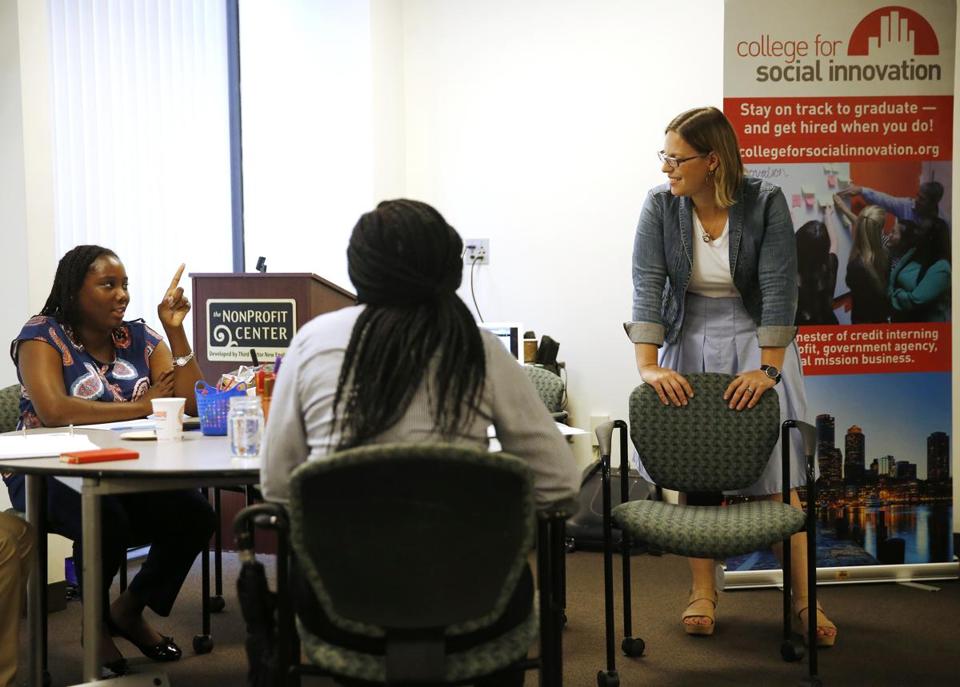Program offers students credit for internships
By Sacha Pfeiffer BOSTON GLOBE | SEPTEMBER 10, 2016

An unpaid internship, Eric Schwarz likes to say, changed his life.
At age 19, Schwarz took a semester off from the University of Vermont to volunteer for Gary Hart’s 1980 Senate reelection campaign. The experience gave him job skills, self-confidence, and a professional network, leading to another political internship and, eventually, his first job.
“It put me on my path,” said Schwarz, who later became executive director of City Year Boston and cofounder of Boston-based Citizen Schools.
But Schwarz acknowledges that he could not have done that first internship without the financial support of his parents and that many less affluent students never get similar opportunities.
That’s why he cofounded College for Social Innovation, a new Boston organization that lets college students receive full academic credit while spending a semester as unpaid interns in the social service sector. Students continue paying tuition during their internship, but they incur no additional costs and their college graduation is not delayed.
Students Markiesha Duverneau and Gabrielle Greaves discussed the pros and cons of their particular leadership styles.
Students Markiesha Duverneau and Gabrielle Greaves discussed the pros and cons of their particular leadership styles.
A way for college graduates to do good and do well ServiceCorps lets corporate-bound college graduates delay their for-profit careers to work full-time in the social sector.
Less wealthy students are sometimes unable to take advantage of internship programs because some of them don’t offer college credit. And unpaid internships during the summer or school breaks aren’t an option for low-income students who need to earn money for tuition.
With that in mind, 60 percent of College for Social Innovation’s participants are low-income, minorities, or first-generation college students. The program does not pay its interns, Schwarz said, because doing so would make the program much more difficult to grow and expand. “An internship with a great mentor can be the difference-maker in someone’s career, but low-income kids don’t tend to have access to those life-changing internship opportunities, so we’re trying to give them that,” said Schwarz, who created College for Social Innovation with Lisa Jackson, who’s spent nearly two decades working in Boston’s nonprofit and philanthropic sectors.
This fall, 14 students from Clark University in Worcester and the University of New Hampshire — the program’s two partner schools so far — are participating. They’ve been paired with 14 Boston-area groups, including Codman Academy Charter Public School, Freedom House, PlayWorks, Strong Women Strong Girls, and the city of Boston’s Department of Innovation and Technology. Each week, students spend 32 hours interning, as well as one evening and one weekday in seminars, and every participant is paired with a mentor.
Cambridge resident and Clark sophomore Linda Mindaye, 19, who was born in Ethiopia, is interning at Citizen Schools.
“I didn’t want to take time off from school, but I wanted to find ways to get hands-on experience in a classroom and get credit for it,” she said.
“This program offers the middle ground of being in a classroom while staying in college and graduating on time” through an internship that emphasizes creative problem-solving in the social sector.
College for Social Innovation was similarly appealing for Sean Fogarty, 27, a self-described nontraditional student from Exeter, N.H., who just entered his senior year at UNH, where he’s majoring in sustainable agriculture and food systems.
“I had been working at a research lab on campus, but I was missing out on the ability to gain credit for that,” he said.
Through his internship at Green City Growers, which installs and maintains urban farms and vegetable gardens in Boston, he’s getting work experience without sacrificing academic credit.
Clark Provost Davis Baird said the college is rethinking its approach to education by putting more emphasis on experiences outside the classroom, and College for Social Innovation “fits perfectly with that focus,” he added.
“Consistent research says this generation cares very deeply about having a career that will make an impact on society,” said Fiona Wilson, executive director of UNH’s Center for Social Innovation and Enterprise.
Sacha Pfeiffer can be reached at pfeiffer@globe.com. Follow her on Twitter at @SachaPfeiffer.
